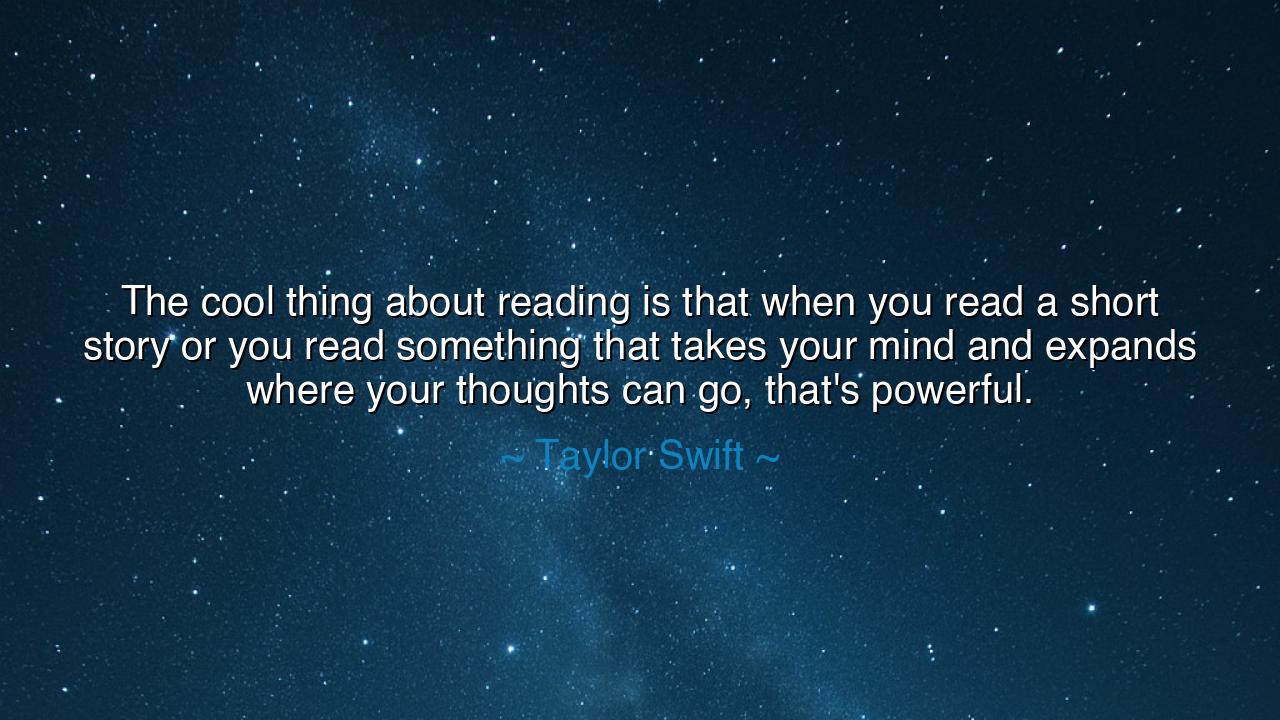
The cool thing about reading is that when you read a short story
The cool thing about reading is that when you read a short story or you read something that takes your mind and expands where your thoughts can go, that's powerful.






"The cool thing about reading is that when you read a short story or you read something that takes your mind and expands where your thoughts can go, that's powerful." These words from Taylor Swift reflect a profound truth about the transformative power of reading—how it has the ability to expand the boundaries of our imagination and deepen our understanding of the world. In this simple, yet profound statement, Swift acknowledges that reading is not merely a passive act, but a gateway to a broader, more nuanced perspective. It allows us to transcend the confines of our immediate surroundings and connect with the wisdom, experiences, and possibilities that lie beyond our own limited view.
In the ancient world, reading and storytelling were not just forms of entertainment—they were powerful tools for enlightenment and personal transformation. Homer's epic tales of the Trojan War in The Iliad and the journey of Odysseus in The Odyssey were not only great literary works but lessons in humanity, resilience, and self-discovery. For the Greeks, literature and storytelling were ways to expand the mind, to explore the depths of human experience, and to connect with the divine and the eternal. The Greeks believed that through stories, individuals could learn not just about others, but about their own potential, desires, and challenges.
Much like the philosophers of ancient Greece, Plato and Aristotle recognized the power of literature to shape the mind. Plato, in his Republic, emphasized the importance of myths and stories as a way of imparting wisdom to the people. He believed that through carefully crafted stories, people could be taught moral values, virtue, and the complex truths of existence. Plato’s student, Aristotle, took this further, positing that literature, especially tragedy, had the power to cathartically cleanse the emotions of the reader, expanding their capacity for empathy, wisdom, and emotional resilience. This idea of literature as a transformative force is one that Taylor Swift echoes in her understanding of reading’s potential to expand the mind.
Swift’s emphasis on how reading expands the mind also aligns with the renaissance ideals of thinkers like Leonardo da Vinci, who believed in the interconnectedness of knowledge. Da Vinci was not just a painter, but a scientist, engineer, and inventor. His quest for understanding led him to read voraciously across disciplines, which allowed his mind to make connections between seemingly unrelated ideas. The power of reading for da Vinci, and for many of the great Renaissance thinkers, was that it unleashed creativity by allowing them to think beyond the ordinary confines of their own field and to see the world with new eyes. Through literature and learning, da Vinci and others were able to imagine a world that had yet to exist, much as reading allows us to imagine possibilities that might not yet have been realized.
The lesson from Swift’s words is not only about the joy of reading but about how literature has the power to empower us. A good story, whether it’s a short story, a novel, or an ancient text, has the ability to reshape the way we see the world. In reading, we find new perspectives, encounter new ideas, and engage with different lives and cultures. A short story, as Swift highlights, can take us to a new place, allowing us to see beyond the ordinary, to understand complexities, and to question assumptions. This act of expansion is both personal and universal—it broadens the reader’s horizons and enhances their ability to navigate the world with empathy, wisdom, and imagination.
Consider, too, the story of Mahatma Gandhi, whose reading and self-education played a pivotal role in shaping his philosophy of nonviolence and social change. Gandhi was deeply influenced by the works of Leo Tolstoy and the Bhagavad Gita, and he once said that reading these texts allowed him to expand his consciousness and understand the deeper truths of human suffering and compassion. Gandhi’s example shows that reading is not just about intellectual growth, but about gaining the tools to transform the world and one's own life. The expansion of the mind that comes from reading is not a passive experience—it is a tool for action.
The power of reading, therefore, lies in its ability to transform the mind and spirit, to expand the range of our thoughts, and to help us navigate the world with greater understanding and empathy. To read is to engage with the world on a deeper level, to challenge the boundaries of our perception, and to embrace new ideas and possibilities. In the act of reading, we come to realize that our own lives are part of a greater narrative, one that spans across cultures, time periods, and human experiences.
In your own life, consider the transformative power of reading. Set aside time to read with intention, choosing stories and ideas that will challenge you, expand your thinking, and inspire you to grow. Just as Homer’s epics shaped the thoughts of ancient Greeks, and Gandhi’s readings shaped the course of India’s independence, so too can the stories you choose to engage with today shape the future of your own mind and spirit. The world is full of stories waiting to expand the scope of your thoughts and the depth of your understanding—embrace them, for in doing so, you unlock the power to shape your future.






AAdministratorAdministrator
Welcome, honored guests. Please leave a comment, we will respond soon